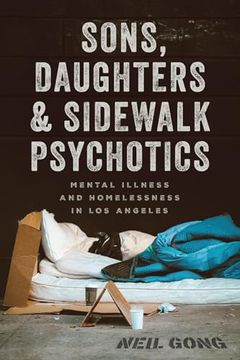Sons, Daughters, and Sidewalk Psychotics: Mental Illness and Homelessness in los Angeles (en Inglés)
Reseña del libro "Sons, Daughters, and Sidewalk Psychotics: Mental Illness and Homelessness in los Angeles (en Inglés)"
Sociologist Neil Gong explains why mental health treatment in Los Angeles rarely succeeds, for the rich, the poor, and everyone in between. In 2022, Los Angeles became the US county with the largest population of unhoused people, drawing a stark contrast with the wealth on display in its opulent neighborhoods. In Sons, Daughters, and Sidewalk Psychotics, sociologist Neil Gong traces the divide between the haves and have-nots in the psychiatric treatment systems that shape the life trajectories of people living with serious mental illness. In the decades since the United States closed its mental hospitals in favor of non-institutional treatment, two drastically different forms of community psychiatric services have developed: public safety-net clinics focused on keeping patients housed and out of jail, and elite private care trying to push clients toward respectable futures. In Downtown Los Angeles, many people in psychiatric crisis only receive help after experiencing homelessness or arrests. Public providers engage in guerrilla social work to secure them housing and safety, but these programs are rarely able to deliver true rehabilitation for psychological distress and addiction. Patients are free to refuse treatment or use illegal drugs--so long as they do so away from public view. Across town in West LA or Malibu, wealthy people diagnosed with serious mental illness attend luxurious treatment centers. Programs may offer yoga and organic meals alongside personalized therapeutic treatments, but patients can feel trapped, as their families pay exorbitantly to surveil and "fix" them. Meanwhile, middle-class families--stymied by private insurers, unable to afford elite providers, and yet not poor enough to qualify for social services--struggle to find care at all. Gong's findings raise uncomfortable questions about urban policy, family dynamics, and what it means to respect individual freedom. His comparative approach reminds us that every "sidewalk psychotic" is also a beloved relative and that the kinds of policies we support likely depend on whether we see those with mental illness as a public social problem or as somebody's kin. At a time when many voters merely want streets cleared of "problem people," Gong's book helps us imagine a fundamentally different psychiatric system--one that will meet the needs of patients, families, and society at large.

